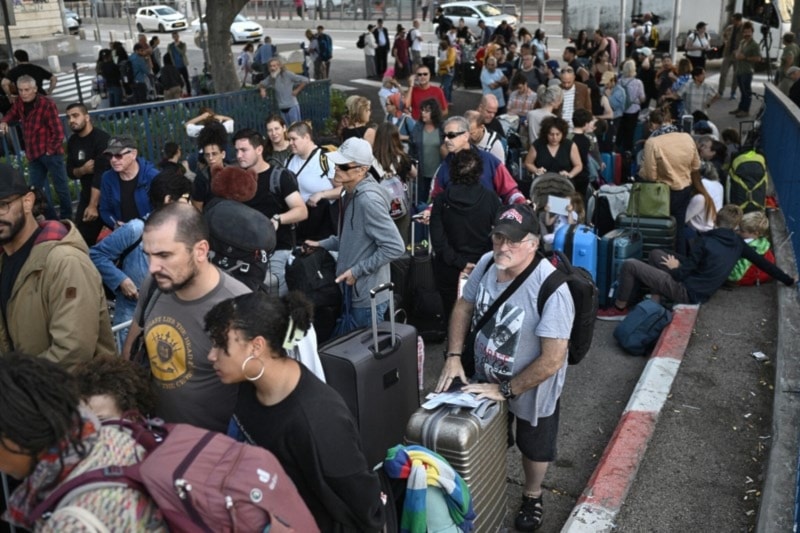Israelis smothered by economic crises as war on Gaza continues
Bloomberg reports that the cost of living in the occupation entity has skyrocketed across major aspects of life.
-

Israelis and foreigners wait to be evacuated from the port of Haifa to Cyprus following the start of the war on Gaza, on October 16, 2023. (AFP)
The Israeli war on Gaza has left the occupation entity struggling with a severe economic crisis, which has now made its way to the settlers themselves with no solutions in sight, Bloomberg said in a report.
After Operation Al-Aqsa Flood in October 2023, tens of thousands of Israelis residing in Gaza's envelope fled the settlements to farther areas. Directly following the operation, the housing stock plummeted by 5%.
Read more: From North to South, ‘Israel’ isolated, cornered, and dealt blows
Most of the Israelis who fled the area have been living in rented hotel rooms since. Almost nine months into the war, housing leases have skyrocketed. According to the newspaper, citing an Israeli from the Ofakim settlement, the rent increase surpassed a quarter of the monthly consumer basket prices in the entity.
The "inflationary chain reaction" of the worst war "Israel" has witnessed in almost five decades is now "coming into view," Bloomberg said.
The initial "shock to consumer spending" was huge to the extent it effectively kept inflation from spiraling despite economic disruptions. Yet, with domestic demand on the rise, prices for various goods and services are now rapidly climbing.
Read more: Israeli startups grapple with war, failure as economy plunges: WSJ
The Israeli central bank had intentions to ease monetary policy further. However, due to the worsening economic outlook (which could include factors like slower growth, higher unemployment, or increased inflation), the central bank was forced to reconsider its plans. This would mean that borrowing costs may remain elevated for a longer period as the government looks for finances by issuing bonds.
As unemployment rates return to levels similar to those before the pandemic, and with an approximate 8% increase in wages in the first two months of 2024, among other pressing factors, such as higher taxes and a volatile currency, inflation will be much harder to tame.
Meanwhile, the Israeli Finance Ministry forecasts that inflation will be 3.3% at year's end, with housing, food, and transportation being the major contributors.
Read more: Regional response to Gaza war jeopardizes Israeli economic hegemony
Inaccessible farmlands
Food prices were particularly affected by the war that sent shockwaves across the Israeli economy. Despite the passage of time, there has been no significant relief in the increase in food prices.
According to Bloomberg, almost half of the entity's largest food firms (locally produced and imported) have hiked their prices by as much as 30% since January.
Additionally, with Hezbollah's continued operations, some one-third of farmlands have become inaccessible, while the farming workforce has sunk by 40%, BDO Consulting said.
Yemen imposed an escalatory naval blockade on "Israel" shortly after the war on Gaza began. This has resulted in a significant increase in prices and duration of product deliveries to the entity. Turkey's recent halt of exports worsened the matter.
“This has increased dependency on imports, which on their part, have grown costlier due to rising transportation fees and the Turkish trade ban on Israel,” said Chen Herzog, chief economist of BDO Consulting.
The aviation industry also received a severe hit.
Since October, the average volume of daily flights to "Israel" dropped by 40%, after the entity lost services of a third of the international carriers it was dealing with. According to Bloomberg, the most significant contributor to inflation in April was the substantial 11% increase in airfare prices.
“Airlines seek certainty,” said Nir Mazor, deputy head of tourism firm Kishrey Teufa. “The next window of opportunity for their return is October. If things haven’t settled down by then, that could be delayed to April 2025.”
Not going back
Approximately one-third of construction sites were closed after the occupation imposed a ban on Palestinian workers, who represent the majority of the workforce in the sector, significantly reducing productivity across the industry.
This situation risks delaying the recovery of the housing supply for at least two years, prompting more Israelis who fled northern settlements to opt for renting.
On the northern front, tens of thousands of Israelis evacuated since the start of the war on Gaza, as Hezbollah's operations in support of Gaza continue.
A Ruppin Academic Center poll concluded that over half of settlers who left had no intention of going back.
“The fact that residents of the north have been away from home for over six months, with no end in sight, is bringing many of them to seek long-term housing solutions in safer locations,” said Tal Kopel, head of the Madlan Israeli real estate company. “And this is putting pressure on the rental market.”

 5 Min Read
5 Min Read








